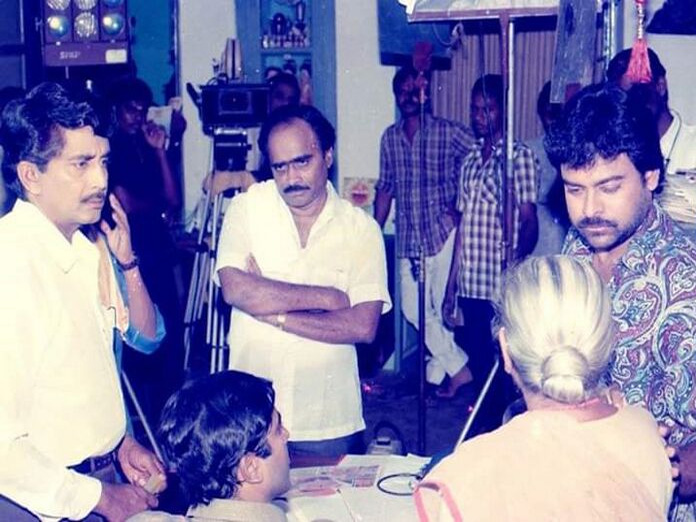Live
- Naxalism has now given way to urban Naxalism in India: PM
- BJP ranks erupt in celebrations over MLC victory
- Massive fire breaks out at scrap godown in Bahadurpura
- Homestay facilities in tribal areas to boost tourism
- Cabinet green signals SC sub-categorisation
- 'Chintan Shivir' in Hyd to draft roadmap for 2028 Olympics
- Dy CM Bhatti lays foundation stone for road expansion
- HYDRA boss inspects lakes at Khajaguda, Ibrahimbagh
- Know about Acharya Indravarman and Most trusted astrologers on the List of Top 10 Best Astrologers in India
- Search Operation Begins for Missing Workers in SLBC Tunnel
Just In

The demise of veteran film director Vijaya Bapineedu was like a bitter pill for the Telugu film audience of the 80s and 90s During this period, his films enthralled audience with a great quotient of entertainment
The demise of veteran film director Vijaya Bapineedu was like a bitter pill for the Telugu film audience of the 80’s and 90’s. During this period, his films enthralled audience with a great quotient of entertainment.
It was the time when the country witnessed frustrated youth, corrupted governance and many social issues. Films with left-orientation scored over commercial flicks. Vijaya Bapineedu turned the tables with his films, full of commercial elements but not overlooking the trend.
His concern about social and economical issues reflected in his stories. Unemployment, exploitation, cheating and sufferings of middle class, their craving for earthly possessions and helplessness etc., were common elements in his movies.
The versatile filmmaker Bapineedu had made his mark in many departments as a writer, editor of magazines, director and producer during his illustrious career spanning 46 years in the film industry. What made him a successful director? Though he banked on commercial elements, he had always been connected with the themes related to middle-class, the patrons of the films during the period.
He touched upon their issues, sentiments, relationships and spiced up the story with commercial add-ons. He stuck to this format right from his first film ‘Dabbu Dabbu Dabbu’ (1981) to the last flick ‘Kodukulu’ (1998).
His ventures with Chiranjeevi were also examples for typical style and taste. Chiranjeevi was a commercial hero with mass following. His fans and viewers were expecting action scenes and dance moves from him. But Bapineedu successfully accomplished his kind of movies with Chiranjeevi depicting family sentiment and middle-class drama; ‘Patnam Vachin Prathivrathalu’ (1982), ‘Magamaharaju’ (1983), ‘Mahanagaramlo Mayagadu’ (1984), ‘Magadheerudu’ (1986).
The greatest flicks by him with Chiranjeevi are ‘Khaidi Number 786’ (1988) and ‘Gang Leader’ (1991), are also no exception to this. Both the films have family drama, relations and sufferings that are commonly attributed to middle class. When he wanted more family flavour, he chose Sobhan Babu. ‘Bharyamani’ (1984), ‘Maharaju’ (1985) are the best samples for his obsession for drama.
Apart from middle class themes, Vijaya Bapineedu preferred comedy. He picked Rajendra Prasad, who was budding hero in that genre of the time. ‘Naku Pellam Kavali’ (1987), ‘Dongakollu’ (1988), ‘Julakataka’ (1989), ‘Mahajananiki Maradalu Pilla’ (1990), ‘Family’ (1994) are the movies which have the family drama alongside some amazing comedy.
The biggest success of his career ‘Gang Leader’, which is also one of the greatest milestones in Chiranjeevi’s film life is a well-knit family story with sentiments. The same movie remade into Hindi with title ‘Aaj ka Gundaraj’, directed by Raviraja Pinisetty was also superhit. It proved yet again that Vijaya Bapineedu’s formula worked well in 90’s.
He started as a writer in a detective magazine and edited three film magazines Vijaya, Bommarillu and Neelima. Vijaya, the Telugu monthly was a successful venture and a household name in 80’s. The children’s magazine ‘Bommarillu’ was also as popular as Chandamama in those days. His journalistic background helped him to connect with the people.
Present generation may not know much about him. But his contribution to the film industry and journalism are exceptionally great and important to be remembered and written in the history of Telugu films.
- Dr G Balakrishna

© 2025 Hyderabad Media House Limited/The Hans India. All rights reserved. Powered by hocalwire.com







